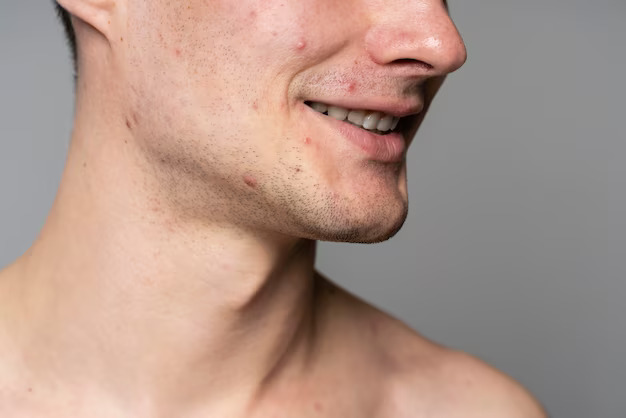If there’s one thing almost everyone can relate to in beauty and wellness, it is the common yet irritating skin condition – acne. The concern over acne and its management is perennial for young adults and adults alike. But did you know that acne doesn’t just pop out as a single fixture on your face, fully formed and ready to cause distress? It has a lifecycle, or more accurately, a progression of stages, and understanding these stages is pertinent to their management.
In this article, Dr Justin Boey, Medical Director of Sozo Aesthetic Clinic, will discuss the intricacies of acne at its various stages, offering insights into the symptoms, treatments, and crucial prevention tips for each phase. Understanding these stages can be the key to finding the right path for effective acne management, ensuring healthier and clearer skin.
Contents
The Complex Nature of Acne
Acne is more than just a mere inconvenience or pain in the beauty-conscious generation. It’s one of the most common skin diseases, affecting 9.4% of the global population. The multifactorial nature of acne is rooted in the interplay of genetics, hormonal imbalances, lifestyle factors, and pathogenic processes within the skin. From puberty through adulthood, it can be a persistent challenge and, for some, a point of intervention only when the highly visible symptoms become a cause for concern.
Medical experts at the forefront of tackling acne, like the medical director of Sozo Aesthetic Clinic, Dr Justin Boey, emphasise a holistic approach towards acne management. Dr. Boey believes that understanding the stages of acne can lead to applying effective acne treatments tailored to the patient’s unique needs.
Each stage of acne has its challenges, and it is critical to manage them effectively to prevent the progression of this skin condition.
The 5 Stages of Acne

After a brief overview of why understanding the stages of acne is important, the blog post will be divided into sections covering each stage. Each section will focus on the symptoms, causes, treatment options, and prevention tips tailored to that stage.
Stage 1: Non-Inflammatory Acne (Comedones)
You may not even be aware that the acne process has started at this stage, as it doesn’t exhibit the typical inflammation that often accompanies acne breakouts. This initial phase can be deceiving, leading individuals to overlook the early signs of acne development.
Description
Non-inflammatory or comedonal acne represents the initial stage of acne development. This type typically originates from minor obstructions within the hair follicles, leading to the formation of comedones. These comedones can manifest as either open (blackheads) or closed (whiteheads) lesions on the skin.
Symptoms
You can observe open and closed comedones on your skin. Blackheads, known as open comedones, appear as dark spots on your skin due to sebum oxidation in the follicle. On the other hand, whiteheads, also called closed comedones, are follicles closed from the skin’s surface, leading to a different appearance than blackheads.
Treatments
For many individuals, over-the-counter (OTC) topical treatments oral medications such as retinoids or salicylic acid effectively combat comedonal acne. These treatments function by penetrating the pores to remove excess sebum, unclog pores, and diminish the accumulation of dead skin cells, thereby aiding in the prevention of acne breakouts.
Prevention Tips
Simple self-care practices, like incorporating regular exfoliation into your skincare routine and opting for non-comedogenic products, are crucial in combating comedonal acne. By preventing the advancement of comedonal acne to more severe forms, you can maintain healthier and clearer skin in the long run.
Stage 2: Mild Inflammatory Acne (Papules)
This stage is a bit more noticeable, with redness and slight inflammation on the skin surface.
Description
Mild inflammatory acne, or papules, is a common acne that presents as red and swollen lesions. Due to the inflammation of the skin, these bumps are often tender to the touch. This stage of acne occurs when bacteria proliferate within the blocked hair follicles, leading to the characteristic appearance of bumps on the skin.
Symptoms
Abscesses are typically smaller and frequently represent the initial indicator of inflammation in acne. Unlike pimples, they do not contain pus but can be sensitive to pressure when touched. These raised, red bumps can commonly occur in acne-prone skin, often preceding other breakouts.
Treatments
Topical antibacterials, such as creams or gels containing ingredients like benzoyl peroxide, have shown great effectiveness at this stage in skincare routines. They target and kill the bacteria responsible for the acne scars and breakouts, helping to clear the skin and prevent further irritation.
Prevention Tips
Consistency in maintaining your skincare routine is crucial for healthy skin. Any disruption in your routine has the potential to trigger an acne flare-up, which can be frustrating to deal with. To prevent this, use gentle cleansers suitable for your skin type to keep your skin clean. Additionally, avoiding touching your face throughout the day is essential to minimise the risk of transferring bacteria and oils that can clog pores and lead to breakouts.
Stage 3: Moderate Inflammatory Acne (Pustules)

The inflammation becomes more pronounced with bumps, and the lesions are usually larger and more visible.
Description
Moderate inflammatory acne, a common skin condition, is characterised by pimples. These bumps, larger than papules, typically have a red base and are topped with a yellowish or white pus-filled head. The inflammation in this type of moderate acne can cause discomfort and may require specific treatment to manage effectively.
Symptoms
With the emergence of pimples, you may notice a heightened level of inflammation in the affected areas. This might lead to a strong urge to pop them, unknowingly worsening the condition and potentially causing further irritation and discomfort.
Treatments
This stage of treatment may often involve a combination of topical treatments, such as creams or ointments, along with topical antibiotics, with the potential use of oral antibiotics prescribed by a healthcare professional.
Prevention Tips
Avoid giving in to the temptation to pick or squeeze these pimples, as doing so can result in long-lasting scars or the potential spread of harmful bacteria, which may worsen the skin condition and prolong the healing process.
Stage 4: Severe Inflammatory Acne (Nodules)
When you reach the nodular stage, you can feel the hard, painful nodules beneath the skin’s surface.
Description
Nodular acne is recognised as a severe form of acne characterised by the development of large, tender nodules beneath the skin. These painful lesions can be deep-seated and lead to long-lasting skin inflammation.
Symptoms
Unlike pustules and papules, which are more superficial and tend to be smaller, nodules develop deeper within the skin, forming larger, more solid bumps. The denser, deeper inflammation of nodules increases the risk of scarring and often results in more prolonged and painful skin conditions. It is important to address nodular acne promptly to prevent potential long-term skin damage and scarring.
Treatments
Severe nodular acne, characterised by deep, painful bumps under the skin, sometimes requires more aggressive treatments than topical medications like oral antibiotics and retinoids. These medications work by targeting bacteria and reducing inflammation to improve skin condition. In instances where hormonal imbalances contribute to acne, hormonal treatments, such as oral contraceptives or anti-androgen medications, may be necessary to address the underlying cause effectively.
Prevention Tips
While seeking professional care is vital at this stage, it is equally crucial to remember that refraining from do-it-yourself treatments and opting for expert assistance can greatly impact the outcome and ensure the best possible results.
Stage 5: Cystic Acne
Cystic acne is the most severe and provides the greatest risk of long-term scarring.
Description
At this stage, cysts are notably large, containing pus, and are deeply embedded within the subcutaneous layers of the skin, causing discomfort and inflammation in the affected area.
Symptoms
Cystic acne can be highly painful, causing deep, inflamed breakouts that are often tender to the touch. The risk of scarring is at its peak with this severe form of acne, as the blemishes penetrate deep into the skin layers, potentially leaving lasting marks. When dealing with cystic acne, seeking professional guidance for effective acne treatment and skin care management is important.
Treatments
Isotretinoin, which is effective in severe cases, is the recommended standard treatment for cystic acne. In addition to topical treatment, professional extraction and corticosteroid injections can also reduce the inflammation and discomfort associated with individual cysts.
Prevention Tips
Professional advice is crucial when dealing with severe acne. Tailored skincare prescriptions and consistent consultations with a professional aesthetic practitioner play a vital role in effectively managing acne lesions and improving the condition. Establishing a comprehensive skincare routine and following expert recommendations can make a significant difference in addressing severe acne concerns.
How To Care for Acne at Any Stage

Integrating lifestyle changes can play a significant role in managing acne at any stage. A well-balanced diet, low in sugar and high in fruits, vegetables, and lean proteins, can help regulate hormones and reduce inflammation. Hydration is also key; drinking adequate water each day helps flush out toxins that may contribute to acne. Stress management techniques such as yoga, meditation, and adequate sleep can further aid in reducing acne severity, as stress can exacerbate the condition.
Despite these measures, it’s crucial to note that severe stages of acne, such as nodular and cystic acne, often require professional medical intervention. Over-the-counter remedies and lifestyle modifications may not be sufficient for these advanced stages. Seeking the advice of a professional aesthetic practitioner can provide access to prescription medications and treatments that are more effective in controlling severe acne and preventing permanent scarring.
Therefore, whilst lifestyle adjustments can help manage acne, they complement rather than replace the need for professional consultation, especially in more severe cases.
FAQs on Acne Stages
Addressing common questions about acne stages, symptoms, and treatments can clarify the condition and dispel myths about it.
Do All Acne Stages Require Professional Treatment?
During the initial stages of acne, individuals can typically manage the condition themselves using over-the-counter products and basic preventive strategies such as gentle cleansing routines and avoiding harsh skincare products. However, seeking professional medical attention becomes necessary for effective treatment and management as acne progresses to more severe stages.
Can Acne Progress Through All Stages?
Yes, acne can progress in different stages for different individuals, and the preventive role of early treatment is paramount. Regularly consulting with an aesthetic professional can help gauge your acne severity and progression.
Is It Possible to Skip Stages of Acne?
Acne can be quite unpredictable as it is influenced by various factors that can worsen or improve the condition. To manage and treat acne more effectively, it is essential to maintain a consistent skincare routine tailored to your skin type. Additionally, incorporating preventive measures such as avoiding harsh products and maintaining a healthy diet can significantly prevent unnecessary severe acne progression. By taking proactive steps and being mindful of what works best for your skin, you can better manage and minimise the impact of acne on your skin health.
Does Acne Get Worse Before It Gets Better?
Yes, acne can sometimes worsen before it gets better, especially during the initial stages of a new acne treatment alone. This happens when the acne treatment draws out impurities and begins to heal the skin from the inside out.
Conclusion
Understanding the nuances of acne stages is the first step to effective management. By recognising the symptoms, initiating appropriate treatments, and adopting preventive strategies, it is possible to subdue this common skin ailment. Consistency in your skincare, regular professional advice, and lifestyle changes all contribute to the larger picture of acne vulgaris management. Remember, diligence in skincare is a long-term investment, and the payoff is well worth it – a confident, acne-free you.





